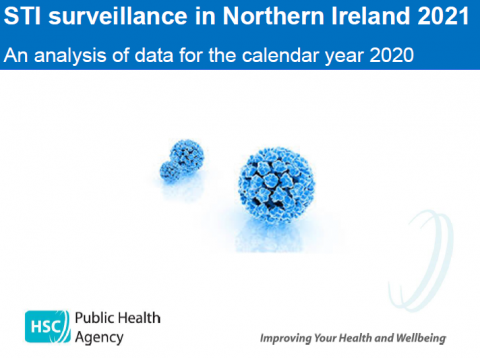New STI stats reveal a move to at home testing

The latest sexual health figures released today by the Public Health Agency (PHA) in its ‘Sexually Transmitted Infection surveillance in Northern Ireland 2021: An analysis of data for the calendar year 2020’ report show a decrease in the number of new Sexually Transmitted Infections (STIs) diagnoses made in Genitourinary Medicine (GUM) clinics in Northern Ireland and an increase in demand for home STI testing kits.
In 2020, the number of sexual health screens in GUM clinics decreased 72% when compared with 2019. During 2020 there was a 43% decrease in new STI diagnoses, 20% in other STI diagnoses and 15% decrease in other GUM clinic diagnoses when compared with 2019.
Dr Gillian Armstrong, Interim Head of Health Protection at the PHA, said: “The reduction in diagnoses of STIs in GUM clinics in 2020 is likely to reflect restricted access to services during the COVID-19 pandemic. The restrictions on social mixing put in place for COVID-19 may have also had some impact, therefore caution is required in making any comparisons to other time periods.
“In March 2020, GUM services directed people with no symptoms to use home STI testing through SH24. SH24 is a sexual health testing service that provides confidential home testing for chlamydia, gonorrhoea, syphilis and HIV and was introduced in 2019. In 2020 the number of home STI testing kits issued increased by 61% when compared with 2019, with 22,228 home testing kits issued and 15,738 returned for testing (70%). People aged between 20-29 years of age accounted for 59% of tests issued.
“The report shows that people aged 16-34 year old account for approximately 80% of new STIs – 65% of new STI diagnoses were in males. It also shows that men who have sex with men (MSM) are at a statistically disproportionate risk of contracting some STIs and account for the majority of the increase seen in syphilis diagnoses during 2020.
Other key findings from report show that:
- 3,534 new STI diagnoses were made in GUM clinics, a decrease of 43% compared with 2019 (6,208);
- 65% (2,292/3,534) of new STI diagnoses were in males;
- Three types of infection accounted for 68% of new STI diagnoses – chlamydia (22%), genital warts (first infections) (26%) and non-specific genital infection (20%);
- Home self-testing for STIs (SH24) was an important route for testing, with a large number of individuals using the service. Ten percent of those tested had a positive or reactive result.
- There were 1,391 diagnoses of chlamydia made by SH24, and 775 made via GUM clinics
- The highest diagnostic rates of the common STIs occur in 16-24 year old females and 20-34 year old males.
- People aged 16-34 years old account for approximately 80% of new STIs.
- MSM are at disproportionate risk of contracting some STIs accounting for 87% of male infectious syphilis, 65% of male gonorrhoea, 18% of male herpes and 32% of male chlamydia infections.
- MSM have accounted for the majority of the increase seen in syphilis diagnoses during 2020.
- Increases were seen in
- Infectious syphilis (15%, increase of 10 diagnoses)
- Genital herpes (recurrence) (9%, increase of 20 diagnoses)
Dr Armstrong continued: “People with STIs don’t always have symptoms, but by having unprotected sex, you could effectively be sleeping with everyone your partner has ever slept with, putting yourself at risk of getting an STI. Therefore, we are urging people to always use a condom.
“The reduction of STI testing and diagnosis in 2020 may mean an increase in people who are living in Northern Ireland with undiagnosed STIs, meaning they could be at risk of complications and of onward transmission to others. It is important to take steps to reduce the risk of harm to yourself and others if there’s a chance you have contracted an STI – simply order a free and discreet home STI test now at sh24.org.uk
“Men who have sex with men having unprotected sex with casual or new partners should have an HIV/STI screen at least annually, and every three months if changing partners regularly, due to their increased risk of infection. The advice is clear – choose to protect yourself and always wear a condom.”
Information on looking after your sexual health, symptoms of STIs (as well as information on STIs which may be symptomless) and details of Northern Ireland GUM clinics can be found at www.sexualhealthni.info
The ‘Sexually Transmitted Infection surveillance in Northern Ireland 2021: An analysis of data for the calendar year 2020’ report is available at www.pha.site/STI
SH24 is used across all Trust areas, with residents of Belfast Health and Social Care Trust accounting for over one third of all test kits issued.
